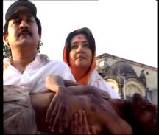|
|
||||
|
by Betty Jo Tucker  According to Mahatma Gandhi, all true art must "help the Soul realize its inner self." Korak Day, the man behind My Karma, named Best International Short Film at New York's International Independent Film Festival, agrees. This 32-year old filmmaker, who served for years as a volunteer in Mother Teresa's home for the dying, also runs Aamar Nijer-My Own, a humanitarian organization dedicated to all the unloved, unguided and lonely people of the world. Among its worthwhile projects are schools and other assistance for women and children in the Butcher's Colony neighborhood of Calcutta, India. Korak Day discussed his philosophy about movies and filmmaking in a special ReelTalk e-mail interview. "Movies give us a personal entertainment facility and I feel they take us to a different reality and we live someone else's life, and we love to live someone else's life and say 'I would have done this or that' -- and we also live our aspirations and dreams and know and see things which don't happen to us," he writes. Because Korak Day's interest in filmmaking stems from a belief that cinema can be used to reach out to people who need love, friendship and care, he states, "Movies may be the most effective way, if we could make use of this medium!" In My Karma, Korak Day tells the story of a sheep that is sacrificed with the promise of a better life as a human. But the rich man he becomes gets absorbed in his work, misses his daughter's birthday party, and drifts apart from his wife. He soon realizes he's no better off than that sheep. In addition to serving as producer, writer, director and composer, Korak Day also plays a dying destitute in his film. He has strong feelings about being the only one to enact this key role. "I have been for six years picking up such dying destitute people . . . and so many have died on my lap and arms. I knew I couldn't cast some real such person . . . and I knew no other actor could play it because it needed a lot to give up and also look like one." The Indian filmmaker fasted for six months to make the character he portrayed as real as possible. "I grew my hair, nails and stopped putting any cream or lotion on my skin (in tropical climate in winters you need something on the skin to prevent it from drying) for months and didn't do anything as my skin was cracking everywhere," he added. When the actress playing his heroine in the film reminded him that there's "something called makeup," Korak Day humbly reminded her of "the thing called 'truth' in acting." Although basically a self-taught filmmaker, Korak Day studied Direction and Screenplay at Calcutta's best film school. He left the school before completing his studies, even though he had spent five years there. His departure made front page news. "I had to do a lot of compromises to my art, and I could not compromise something so basic in the beginning of my film career. I believed that it's more important for me to learn what to shoot (the spirit of the film) rather than how to shoot (the technique)." And Korak Day knew he was in the most appropriate place on earth to learn the spirit of art. "I trained myself with people by working at Mother Teresa's home for the dying destitute and various other organizations with the most needy in the world in terms of life, food, love, faith, spirituality, shelter, etc. -- from the extremes of the street people through the rich people from all over the world who came as volunteers." What's the most important thing Mother Teresa taught him? "To make a balance between heart and brain," the filmmaker explains. "She was a very, very intelligent woman with a very, very good and sharp brain and at the same time a very deeply feeling heart full of love and care." For more information about Korak Day and Aamar Nijer-My Own, visit www.korakday.com.
|
||
|
© 2026 - ReelTalk Movie Reviews Website designed by Dot Pitch Studios, LLC |




